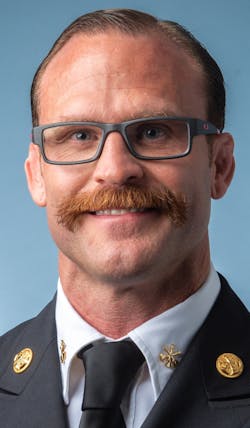Leadership Lessons: What I Learned in 151 Days as an Assistant Chief
At the time of this writing, I’ve been an assistant chief for 151 days. Over these five months, I’ve been trying to find my way in a new world of this profession: the administrative side. To say that I learned a tremendous amount is an understatement. I’ve been reeducated on many of the processes and background functioning of the organization that I love.
My journey isn’t unique, so, please, I’m not special, but I believe that it’s worth sharing the lessons that I learned in the hope that it provides perspective and provokes thought for those who might be considering taking the next step in their career.
We all have different reasons for becoming a firefighter, but, essentially, we knew that we would be going into burning buildings, working EMS calls, extricating people and carrying out a host of other exciting operations. I suspect that not too many of us said, “I can’t wait to go to recruit school, so one day I can do a budget spreadsheet, have difficult conversations and go to meetings.” That said, when you get to experience this part of the profession, you’re likely to find that it’s so much more than you ever thought and that it can be so rewarding—if you remember your journey to get there and where you came from. I always will be that new firefighter on Engine 3, but now, I have the opportunity to make a difference so that the new firefighter on Engine 103 can have a better, safer and happier career.
Success takes a team
As the assistant chief of administration, I am involved in areas that I never was: human resources, finance and budget. I needed assistance in learning processes, but I went in knowing that and willing to learn from others.
Remember, when you’re promoted, technically, you don’t know what you’re doing from experience, because you don’t have any. Yes, training, classes and mentoring prepare you, but you still only have one first day in a new position. You will need others to help you.
Open your mind. Put down your ego and listen.
I learned the administrative side from five nonsworn employees who never ran into a burning building, but I guarantee you this: They are the real deal when it comes to budget, finance, human resources, etc.
Without a team, you aren’t a leader, and you won’t be successful.
Don’t be afraid of guidance
Lean on those who have done it, so you can identify different approaches for situations that you might not have encountered. More than likely, other people experienced it, and they can shed light on why you’re feeling a certain way about a decision or help you to see the decision through a different lens.
Listen more than talk
Yes, you want to share your knowledge and to help the team, but you must learn the team dynamics, too.
Stop thinking that you always must say something. Sometimes, your job is to say nothing. Earn your stripes. Then, you “earn” the respect to say something.
Remain yourself
Your opinion and approach is through your filtering from your previous positions. This is great, because you have a pulse on other positions that you held while you learn another. However, the goal is to mesh those positions, so you keep consistent with who you are with your added responsibility level.
Still a challenge
Budgeting isn’t running into a burning building. Nevertheless, the transition to the administrative side is challenging. Immersing yourself in the work and remembering that your decisions dramatically affect those who do run into burning buildings keep you grounded.
Communicate
Make sure that you stay connected to those who you worked with and engage in the new generation.
Use text messages, phone calls, FaceTime, Teams and Zoom. It doesn’t have to be long. The goal is to check on them and to ensure that they are doing well.
Mentor and coach every day
Invest time in another person each day to help that individual to grow personally and professionally. Coach on career paths, show how to schedule effectively, help how to approach difficult conversations, etc.
Yes, promotion brings more responsibilities and a higher level of oversight, but you must remember that the ones who come after you need guidance, coaching, mentoring and for you to be their biggest fan.
Don’t lose the ability to joke around
Of course, this should be done professionally and shouldn’t include vulgarity, but it can be done to loosen up the environment. For example, one particular company tells me, “Chief, get out from behind that desk and work out with us, so we can show you how it’s done.” (They know that I’m an exercise fanatic.) So, my response: “Your weights aren’t heavy enough for me, but I’ll go ahead and approve the purchase of some heavier ones, so I can show you how it’s done.” It’s all in good fun. They laugh. I laugh. Then, if they need to talk about something serious, they know that they can trust me and that I will listen and help them to the best of my abilities.
Yes, I now am an assistant chief, but I still am me, and they must see that.
A student of the game
Pay attention to everything that goes on around you. Watch interactions, body language, speech patterns, attitudes, etc. This doesn’t mean be judgmental. It means be present with yourself and those around you, because you can learn so much and become a better communicator if you do. After all, communication and people skills are the biggest part of the job once you reach certain levels. You must be able to converse with and relate to others in a nonjudgmental fashion and to promote an environment in which others feel that they can approach you.
Also, learn more about emotional intelligence, psychology and the power of positivity.
Your work is just starting
You absolutely do have something to prove—what you did in your career before the promotion got you there. What you do now makes the difference for the people who see you there and allows you to influence an organization in so many ways.
Take the next step in your career, enjoy the journey, and remember, if you don’t promote, then who will?

Dr. David Griffin
Dr. David Griffin is the assistant chief of administration in Charleston, SC. He was the operator of the first-due engine on June 18, 2007, when nine of his fellow firefighters perished. Griffin has come through the ranks in operations in every uniformed position, from firefighter to battalion chief and shift commander to his current position, during his 19-year career in Charleston. He has a bachelor's degree in education from The Citadel, a master's degree in executive fire service leadership, and a doctorate of education in organizational leadership and development. Griffin is the author of "In Honor of The Charleston 9: A Study of Change Following Tragedy," among three other books. He is an international speaker and instructor, a certified Chief Fire Officer and Chief Training Officer with The Center for Public Safety Excellence, an IFSAC/Pro Board-certified Fire Officer IV and a graduate of the Executive Fire Officer Program from the National Fire Academy. He is a graduate of Harvard University's Kennedy School of Executive Education program: Senior Executives in State and Local Government and of the Psychology of Leadership program at Cornell University's SC Johnson College of Business. Griffin is the owner of On A Mission, LLC, at drdavidgriffin.com.






